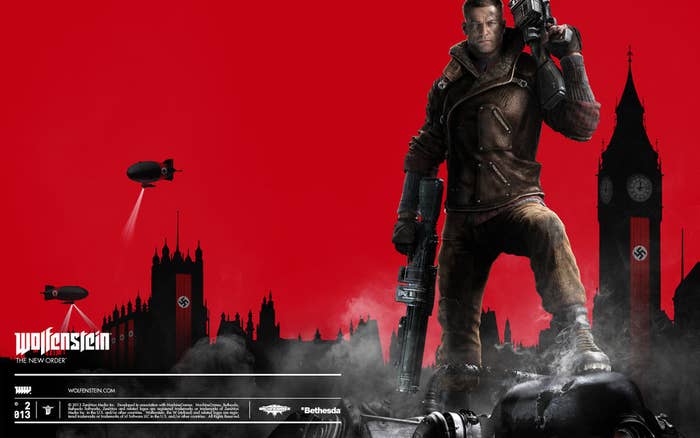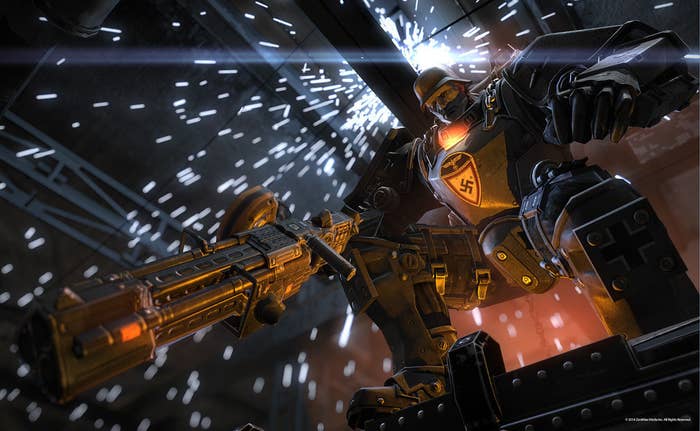
If the world of video games was an American high school, first person shooters would be the jocks. You know: big, loud, and popular; nice to look at; running the gamut from amiable and funny to violent and cruel; mostly not college material. Sometimes they break stuff and get in trouble, but we tend to look the other way. Overall, they have the most fun and ask the fewest questions. Everyone else, to an extent, exists in their shadow.
That is why it has been so strange and not a little amusing, over the past year and change, to see first-person shooters tripping over their shoes, agonizing over their skin, and afraid to speak up in class. Yes, the swaggering flagship genre of AAA gaming has in recent months grown extraordinarily, ridiculously, paralyzingly self-conscious. While the limitations of these games—chiefly that they are not smart and after 25 years of popularity still exclusively predicate themselves on pointing a death stick at stuff—have been apparent for years, they seem to finally be aware themselves. And it is totally fascinating.
The trend began in earnest with BioShock, the 2007 game that many people regard as the best first-person shooter of the past decade. If these games are indeed jocks, BioShock was Friday Night Lights' Tim Riggins: Hunky and brutish, yes, but also soulful, questioning, broodingly philosophical, and irresistibly aware of his own flaws. BioShock was a shooter, but it quoted, like, Ayn Rand, and in a negative way, and it asked smart questions about free will and determinism. Also, it was fun. A few people pointed out that it lacked the courage of its alt-bro convictions, but c'mon, this was progress.
BioShock gave rise to a whole litany of shooters that fashionably challenged the conventions of the genre, with varying degrees of effectiveness. It is also responsible, indirectly, for a wave of dumb and over the top shooters that sprinted gleefully in the opposite direction, waving the white flag of "irony". Finally, BioShock raised hopes, perhaps unreasonably, for its sequel. People expected an even smarter game, one that transcended the inheritance of its genre.
BioShock Infinite released last March to the expected hosannas. But a funny thing happened soon after: grumbling. Then more grumbling. Then a legitimate, heated, nearly existential debate about the nature of the first person shooter. Some of the smartest games writers resented, even detested, BioShock Infinite. Why does it have to be a shooter at all? They asked. Why can't it just be better than that? It wasn't sufficient anymore to simply be the jock with brains. If you're so smart and interesting, people demanded, why do you still act like a jock at all?

The first-person shooter, for the first time in its history, is acutely not cool; démodé. This past fall, the annual po-faced warmongers Call of Duty and Battlefield basically got shouted down. Killzone Shadow Fall, which was supposed to sell PlayStation 4s, was instead largely ignored. The modest innovations of this year's hugely hyped Titanfall were characterized, accurately, as modest innovations, nothing revolutionary. Meanwhile, Halo has settled into profitable outsourced obsolescence and Bungie, the creators of that franchise, have moved on to the ambitious, massively-multiplayer Destiny. FPS fans gaze longingly towards Bellevue, hoping for Half Life 3, but that's a dream, and besides, Portal probably moved the genre forward as much as any game in the past decade. The future of shooters is as unsure as it's ever been.
That's all to say that the timing feels distinctly not right for Wolfenstein: The New Order, the new first person shooter from MachineGames and Bethesda. Is there a franchise more synonymous with the conventional past of first-person shooters than Wolfenstein? This, after all, is the series that, in 1992 with Wolfenstein 3D, quite literally set the conventions of the genre and led to its massive popularity. Why, in a gaming moment defined by uncertainty and resistance towards the tired tropes of the first-person shooter, would anyone want a new Wolfenstein game?
So of course The New Order is, against all odds, one of the best first-person shooters to come along in years. Yes, I know. Somehow, somehow, son-of-son-of-son-of Castle Wolfenstein is an urgent, compelling, funny, well-told, and perhaps most importantly confident videogame, which reminded me of the distinct pleasures that this tired genre once held for its fans.
I don't think I'd realized quite how painfully concerned with themselves shooters had become until I played the first few hours of The New Order, which felt to me like a revelation. This is a game that is blessedly unburdened by deep thoughts, which is not to say it is a game without themes or devoid of meaning. It simply does not take the time to ponder why it exists, and my dear sweet god, what a relief.
Yes, Wolfenstein just plain gets on with it. You play as B.J. Blazkowicz, an American soldier in an alternate future 1960s in which the Nazis have won World War II (why not?) and exert total control over the world through their concrete-and-steel technological superiority. It's a dumb story that is told better than it has any right to be, like most of the things about this game. It is not "look at me I'm dumb" like Bulletstorm or Far Cry 3: Blood Dragon, which is another way of saying "I'm smart"; it's skillfully, artfully dumb, which is truly dumb, which is to say, truly smart. Anyway, the black-and-white moral stakes fit perfectly with its clear conscience. We don't have to worry that we are shooting, because we are shooting at Nazis, and it's dumb, and that's okay.
(I wish I had something complex and interesting to add to the observation that shooting at digital Nazis is satisfying and defensible, but I don't. Suffice it to say that we are all products of our culture, and that part of being a product of a culture that was on the right side in World War II is that you get to feel good about shooting at digital Nazis. I think it was part of the Potsdam Agreement. I dunno. Leave me alone.)
About five hours into the game, I reached a section comprising a pitched battle against a battalion of Nazis defending an enormous model of the moon inside a giant planetarium. As I raced Blazkowicz up and down crisscrossing metal walkways, dual assault rifles chucking hot Nazi death, I realized that I was doing something that I almost never do anymore while playing first-person shooters: smiling. There I was, standing atop the Nazi moon, drenched in digital Nazi blood, ecstatic. It is a simple pleasure, uncomplicated and pure, but no one seems to be able to do it anymore without overcompensating. And done correctly, it's wonderful.

Though Wolfenstein: The New Order is old-fashioned in its outlook, it is newfangled in its methods, and by that I mean it has a lot of bells and whistles. These will be catalogued better elsewhere but include long and interesting in-game exposition, 'tasteful' nudity, parts where you drive, and the option to play with satisfaction as either a sneaky fucker or a blatant fucker. For my part, I chose blatant fucker.
Still: this is just a very well-done shooter, and for some people, that will mean it is not enough. A popular argument among smart-game-writer-types in the wake of BioShock Infinite held that first person shooters are prolific because shooting is an easy mechanic to define and produce. In other words, it's easier to make a shooting game, than, say, a talking or an eating or a base-jumping game, because the goals and interactions are easier to manage. Ultimately, what this means is that first person shooters can no longer be mechanically creative. This argument strikes me as incredibly circular. Shooting is only an easy mechanic to define and produce because over the course of three decades gamers have flocked to shooting games, allowing developers to refine this mechanic to a pretty astonishing degree of sophistication. Don't believe me? Play The New Order for an hour and then try playing the original.
When Wolfenstein 3D came out in 1992, it wasn't a huge-budget blockbuster in a dominant genre with an established set of tools; it was goofy shareware that culminated with a boss fight against Hitler in a robot suit. The accomplishment of Wolfenstein: The New Order is that even as it capably integrates the things we now expect from a big narrative shooter, it manages to take us back to a time when these games were weird, joyful, and blissfully unaware of their cultural significance. It conjures an era when first person shooters could be dumb and creative at the same time, and more than that, they could feel good about it. No, this may not be a way forward for the genre, but after years of ponderous self-examination and self-justification, it feels very much like a fresh start. And maybe that's the best lesson for the jocks of gaming, the lesson the rest of us are forced to learn in high school: Just be yourself.
